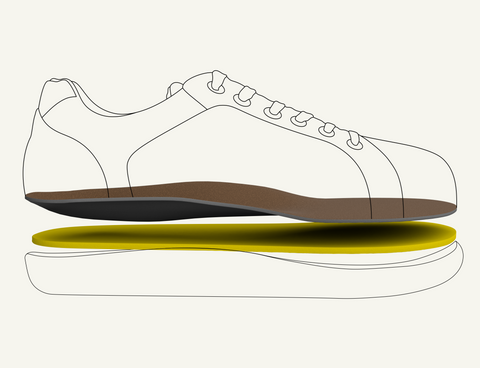How to choose healthy shoes in pregnancy? A physiotherapist gives advice
1) Do I have enough room in my shoes?
During pregnancy, the feet swell, and that’s why they need more space than ever before. The shoe shouldn’t cramp the toes or constrict the foot. Try to move your toes in the shoe – do you have enough room?
Why is space so important? Because when your feet have enough space and can move freely, fluids can circulate in them. You probably won’t avoid swelling in pregnancy, but proper circulation is what will alleviate it.

How much space does the foot need? Enough to stand like in the picture on the left.
2) Does the shoe bend according to the foot?
The shoe should adapt to you, not the other way around. Therefore, look for shoes with flexible and thin soles that bend according to your foot. Shoes with thick, hard soles are a bad choice.
In shoes that respect your movement, your balance will improve. Your foot can "grip" the ground in them similarly to the way your hand grips a handrail. And right now your balance is extremely important so you don't fall on your belly.

Shoes should copy the movement of the feet.
3) Do these shoes have zero drop = zero heel?
Even the thinnest heel will tilt your body forward, changing your posture and the way you walk. This tilt affects the position of the pelvis, thus altering the space for the baby and the organs. You may also notice that it's harder to breathe in heeled shoes. The altered posture restricts your breathing – and especially in pregnancy, you need to breathe freely.
That’s why I recommend shoes with so-called “zero drop”, i.e. shoes with zero heel.

Look for shoes without a heel.
Suffering from pelvic pain during pregnancy? This may be caused by body being tilted. But the pain can also stem from the loosening of ligaments, which is common in pregnancy.
4) Are the shoes breathable?
In pregnancy, the feet swell and sweat. That’s why I recommend breathable footwear that provides fresh air to the foot and wicks away moisture. Especially in the summer, shoes made of natural materials like hemp are great. Also look for special materials such as CF+ vegan leather, which breathes and keeps the feet dry.

5) Are they slip-proof?
It's hard to look out for yourself when you can't see where you’re stepping. That’s why you should choose shoes that don't slip. Shoes that are suitable for pregnant women don’t necessarily need tread like a tractor wheel – however, the material’s adhesive properties are important.
For Ahinsa Shoes, we use thin German soles that we’ve independently tested. We found that they don’t slip, even when they’re wet.

A non-slip sole can look like this too. High tread isn’t necessary.
6) Does it fit me well?
Shoes that fit well can also be bought online, but read the size charts carefully and measure your foot correctly. Here are a few extra tips:
- Measure your feet in the afternoon or evening when they are more swollen. That way, you’ll be sure you’re buying shoes that won’t constrict your feet.
- Add about 0.5cm extra space to allow the foot to move.
If you're not sure, go for the larger size.
7) Can I put the shoes on easily?
Laces are great until you have to tie them under a big tummy. What are the alternatives?
For the summer:
- sandals that you can fasten at the heel with one strap
- dress shoes with one strap
- slippers

Fasten these sandals at the heel and you're ready to head out.
For spring and autumn:

Chelsea boots are easy to put on, even with a big tummy.
For the winter:

You’ll love these boots during your pregnancy. Thanks to the lacing, they’ll fit any calf. And the zipper means you won't have to lace them up.
Can I wear barefoot shoes during pregnancy?
Of course you can! But be careful and use caution when starting to wear barefoot shoes. When you’re pregnant, the way you walk changes – you’ll be stepping down hard and you could hurt yourself, so make sure you’re treading carefully. Alternatively, I recommend starting with shoes from the Comfort range, which will cushion your steps.
What difficulties can you encounter during pregnancy? And what (besides shoes) will help?
What’s actually causing your feet to swell? And why does your back hurt? Let's take a look at the common problems that expectant moms have. The good news is that all of them can be treated.
➡️ Leg swelling: Hormones are to blame
Around the third month of pregnancy, leg swelling appears. This is natural – your body is coping with hormonal changes, and swollen feet are one of the side effects.
What can be done?
- Give your feet some space. Walk barefoot or in spacious shoes.
- Take your socks off. Avoid socks with elastic and ankle constriction.
- Take a walk. Walking keeps the fluids circulating in the body and prevents them from accumulating in the feet.
- Drink. Plenty of fluids will help (and you need them now more than ever).
- Go for a swim. Cool water is good for swollen feet and a sore back.
- Get some rest. Feet up and book in hand. When else will you be able to indulge yourself?
- Sleep on your side with a pillow between your knees. Specially shaped pregnancy pillows help and can also be used later for breastfeeding.
Reading tip: 7 good reasons to walk barefoot during pregnancy.

➡️ Change in the center of gravity and back pain in pregnancy: You’re leaning forward
More weight in the front = change in the center of gravity. The weight of your tummy can be tilting you forward, which is why pregnant women often bend their lumbar when walking and suffer from pain in the lower or even whole back.
What can be done?
- Gain stable ground. Give your feet room in shoes that don't restrict them.
- Walk and exercise. This will activate your legs and your whole body.
- Get your toes moving so they can carry you. We describe how to do this in the e-book Step by Step to a Healthy Stride
- Try a yoga or tai chi session. Pregnancy yoga focuses on stretching painful areas.
- Get rid of your heels. They’re tilting you forward and making the problems worse.
Learn to walk healthily. This e-book will help you.
➡️ Flat feet: the majority of women encounter foot pain in pregnancy
Suffering from foot and leg pain during pregnancy? You’re not alone. The change in your center of gravity causes you to put weight on your foot differently. You're not stepping naturally, and that’s why the foot arch weakens and collapses.
However, the arch is essential for walking: it cushions your steps and stabilizes you. When it weakens, pain in the feet, knees, hips and even back will appear.
What can be done?
- Space – and more space! When you squeeze your foot into a narrow shoe, the arch will almost always weaken.
- Walk barefoot. By doing so, you’ll be activating the muscles in the foot that shape the arch.
- Exercise the arch.

A healthy arch acts like a spring and cushions the foot. A collapsed arch can't do that.
FAQ:
➡️ Can I wear the same shoes during pregnancy as I did before?
Yes, but make sure they meet all the requirements that we've discussed above.
- plenty of room for the toes
- freedom even for swollen feet
- Flexible and bendable sole
- breathable material
- non-slip sole
- no heel
You can wear shoes like this before, during and after pregnancy.
➡️ Can I wear barefoot shoes and walk barefoot during pregnancy?
Yes, I even recommend it! In good barefoot shoes, your feet are free and they move naturally. You’ll prevent swelling and your whole body will benefit from it.
But, if you're not used to barefoot shoes, first practice healthy walking. Start barefoot or in barefoot shoes on soft surfaces and gradually prolong your walks. The e-book Step by Step to a Healthy Stride will help you.
Then start with shoes that give your feet freedom while absorbing sharp impacts. I recommend shoes from the Comfort line that cushion impacts to the heel.

We put a special foam insole and a special flexible layer into the Comfort series shoes to absorb impacts to the heel.
➡️ I have flat feet due to my pregnancy. Will orthopedic insoles help me?
Flat feet indicate weakened and everted ankles or weakened foot muscles. And what does a weakened muscle need? Movement to get stronger. So exercise, walk and strengthen your feet – don't rely on insoles.
Paradoxically, orthopedic insoles can make the problem worse. Passive foot support causes the muscles to stop using their own support, making them weak.
Reading tip: How to cure flat feet? Shoes help. Insoles? Not always.
➡️ Is walking properly and choosing the right shoes really that important for pregnant women?
Absolutely! If you have 10 minutes and are interested in learning more, I recommend this great video with renowned Czech physiotherapists Clara Lewitová and Marika Bajerová. Marika specializes in gynecological physiotherapy, providing care for women during pregnancy and helping them prepare for childbirth.
6 tips for stylish shoes for future moms
In conclusion, I’ve selected 6 pairs of shoes that will benefit your body during pregnancy – stylish, comfortable and above all healthy shoes designed by physiotherapists.
Indulge yourself – your legs and back will thank you for it. And so will your baby. :)
❤️ One-strap sandals
Pregnancy in the summer is challenging because the feet swell even more than normal. That's why I recommend these sandals. You can adjust durable straps to your liking and you're ready to go.

Red sandals will bring you joy at every step.
❤️ The most comfortable dress shoes
These dress shoes will last you for years and are endlessly comfortable. You can tighten the strap to fit your needs and cut off what’s left.

You can take your black dress shoes anywhere and they'll last you for years.
❤️ Airnet slip-on sneakers that breathe
I love Airnet, which stays cool in the summer. Plus, you can slip these sneakers on without bending over.

Airnet is durable and wonderfully breathable. I recommend it for summer.
❤️ Shoes that won’t let you down
In autumn, boots that won’t slip or absorb wetness come in handy. These sneakers are easy to put on and you can quickly fasten them.

Zzzzzip! Your shoes are on in a flash!
❤️ Queen Victoria's time-honored classic
Did you know that Chelsea boots were worn by Queen Victoria? They’re sure to look even better on you, and they’re nearly effortless to put on.

Chelsea boots have an elastic band on the side so you can slip them on in one go.
❤️ Boots for every calf
These boots will fit everyone. They also fasten with just one pull of the zipper.

We have boots in autumn and winter versions. Which version will you choose?









